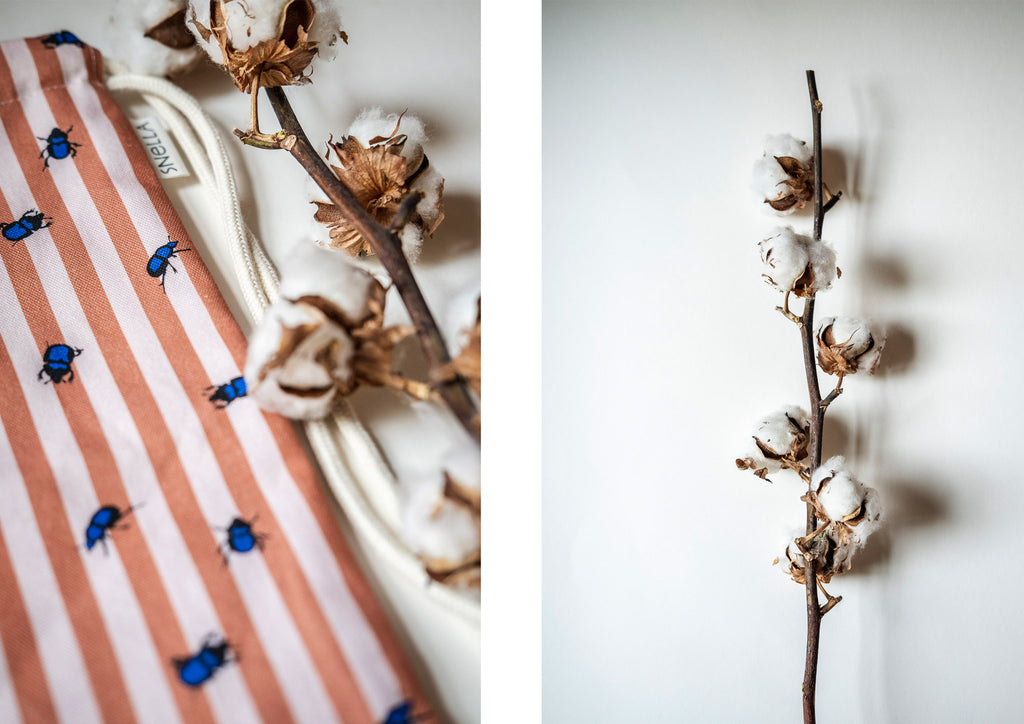Cotton spun to yarn makes comfortable, soft, breathable, and durable textiles. We all seem to love wearing our cotton clothes because it is the most widespread natural fibre used in clothes today.
Roughly 25 million tonnes of cotton is produced annually, accounting for 2.5% of the world's arable land. About 1-2% of the global cotton production is organically grown. Cotton is a shrub originating from tropical and subtropical regions and primarily grown in the Americas, Africa, Egypt, Turkey, and India. It grows naturally with a lot of sunshine, long frost-free periods, and moderate rainfall.

The thirsty crop
Cotton is heavily cultivated and often raised in areas with less rain. About 8000-10000 liters of water is needed to produce 1kg of cotton, mainly supplied by irrigation. Water consumption can rise up to 22500 liters per kilo of cotton during dry periods. This occurs in areas where water supply already is scarce. More than 2 billion people worldwide suffer from inadequate sanitation, and roughly 1 billion people do not even have access to fresh water. It is well known that water-borne illnesses from poor sanitation and lack of freshwater kill millions of people, especially infants and young children, each year. Yet, growing thirsty cotton crops is prioritized in developing countries without sufficient water supplies.

The dirty crop
Because of the mass cultivation of cotton, it relies heavily on chemical pesticides such as fertilisers, herbicides, and insecticides to grow. In fact, although cotton plantations only cover 2.5% of the world's cultivated land, it uses up to 16% of the world's pesticides. That is much more than any other crop. As a result, there is an increased incidence of severe disease, development problems, and cancer exposed to agricultural chemicals. In addition, pesticides contaminate our soil, the air we breathe, and our surface water.
Today, many cotton farmers use genetically modified seeds, so-called Bt cotton, to grow plants withstanding infestation against pests. This has decreased chemicals, but they are more expensive than conventional seeds. The significant risk with Bt cotton is resistant weeds and insects to the protective genes in this type of cotton. Additionally, due to the high price of Bt cotton seeds, there have been cases with seeds falsely being sold as Bt cotton, ruining plantations due to pests. In India, massive outbreaks of pests have arisen due to long seasons without appropriate crop rotation.

The unfair crop
Around 100 million households are engaged in the farming and production of cotton. The majority of people working in the cotton industry live in developing countries. They work long hours, often in debt due to employers' high demands. Salaries are usually low, and workers are subject to agricultural chemicals daily. It is not uncommon for child labour. In addition, the climate crisis and competition from more affluent countries are making cotton farming even more challenging. Sadly, as a result, many cotton farmers in developing countries commit suicide due to decreasing yields and net profits.

Benefits of organic cotton
Organic cotton is grown without using chemical pesticides and non-genetically-modified crops. As a result, the soil and water are kept free from chemical contamination. Cotton workers in plantations are not regularly subjected to harmful chemicals. It also promotes biodiversity as the crops are rotated to reduce pest infestation, keeping the soils naturally healthy, moist, and fertile. At times, beneficial insects are used as a natural insecticide.
Organic cotton farming also requires water, but it does, in fact, reduce water consumption. For example, organic cotton production for a t-shirt saves up to 7500 liters of water compared to chemically farmed. In addition, rainwater is utilised to a greater extent, reducing the need for irrigation from freshwater. Organic farming production is more controlled and regulated, making the workplace for organic cotton farmers safer and more profitable.

Before buying your cotton products, let the price tag and origin determine whether the purchase is worth it in terms of quality products for yourself, the planet, and those making your clothes. Meager prices mean that somebody else than you has paid the price. Cotton from organic origin may be more expensive. Still, it also guarantees that it has been produced respecting our nature and employees. You will definitely feel it in the products you buy and wear!
All the best,
Hannah

